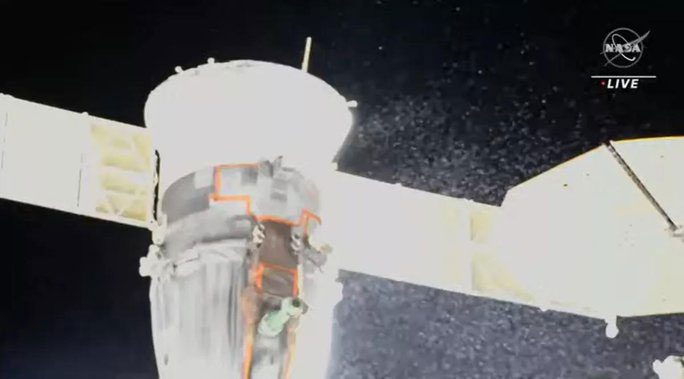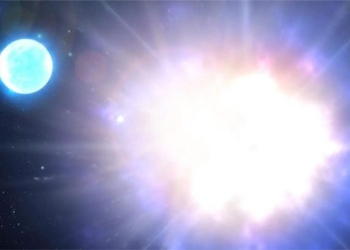The space agencies of Russia and the United States – Roscosmos and NASA – are considering the potential threat posed by existing issues on the Russian spacecraft Soyuz MS-22 and Progress MS-21.
Soyuz MS-22 and Progress MS-21 are two Russian spacecraft that have been working at the International Space Station (ISS) recently. The Soyuz is a crewed spacecraft carrying three astronauts from Roscosmos and NASA, while the Progress is an uncrewed cargo spacecraft.
The Soyuz MS-22 encountered a malfunction in mid-December 2022, followed by the Progress MS-21 just three months later, with both experiencing coolant leaks. The Soyuz was concluded to have been impacted by a piece of meteorite or small debris after a joint investigation by Roscosmos and NASA. Roscosmos suspects that Progress may have been affected by an incident in October 2022, but they remain uncertain.

The Russian Soyuz spacecraft experiencing a leak, with a “cloud” of coolant surrounding its body – (Photo: NASA).
According to Space, NASA’s ISS program director Joel Montalbano stated that the consecutive incidents have prompted Roscosmos to re-examine the production processes of its spacecraft.
“In addition to orbital debris, our team, Roscosmos, and Energia are reviewing the production process” – Montalbano revealed during a press conference about the successful return of another spacecraft, SpaceX Dragon, which previously carried four astronauts from Japan, Russia, and the US to the ISS.
Energia is the main contractor for Russia’s human spaceflight program and is the primary manufacturer for both the Soyuz and Progress spacecraft.
The incidents have rendered the Soyuz MS-22 unsafe to return the three astronauts to Earth, temporarily leaving them “stranded” without a lifeboat in case of emergencies at the ISS, until Russia managed to send the Soyuz MS-23 to the station just days before.
NASA has expressed confidence in the new Soyuz but will keep an eye on any new developments. Roscosmos will do the same.
Since the Soyuz MS-23 – the spacecraft that was supposed to replace the crew on the MS-22 mission in March – has been repurposed as a lifeboat, the mentioned astronauts will have to extend their mission until Russia sends the MS-24 spacecraft with the replacement crew to the station, expected in June.
The damaged Soyuz is expected to be returned in an uncrewed state, while the Progress MS-21 has been maneuvered to “self-destruct” in Earth’s atmosphere, with the remnants falling into the Pacific Ocean on February 19.





















































